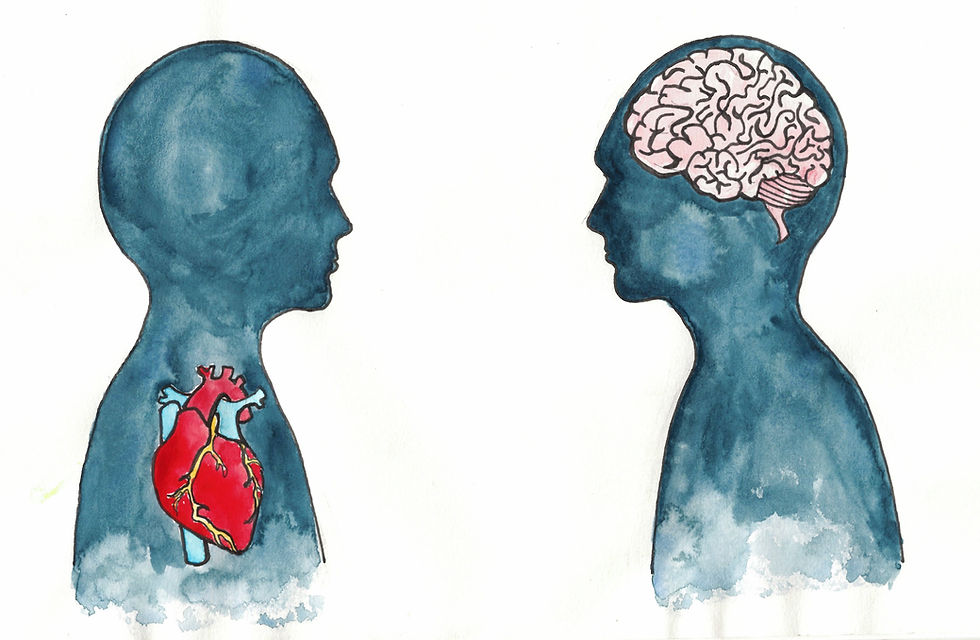Impacts of GLP-1 medications: A personal, occupational perspective of more than just a 'weight loss jab'
- simplefisher

- Oct 12
- 9 min read

The purpose of this article is to explore the influence of GLP-1-type weight loss medications (such as Ozempic, Wegovy and Mounjaro) on occupation. Through personal reflection, it explores the individual occupational impacts of using such medications and the assumptions around obesity - drawing on links from experience working in the field of substance use.
Obesity
Obesity rates have more than doubled in adults since 1990, with now 1 in 8 (16%) of adults worldwide classed as obese (a body mass index of above 30). This trend is predicted to increase. Once associated with high income countries, this is no longer the case. The impacts of obesity can be tracked across the social gradient, meaning those who already experience socio-economic challenges, also experiencing the greatest health-related harms.
Obesity is associated with the leading causes of premature death worldwide, including:
type 2 diabetes
cardiovascular disease
multiple cancers
respiratory diseases
many musculoskeletal conditions
Those living with obesity are more likely to experience occupational disruption or a loss of occupation, through unemployment, stigma and discrimination.
Such individuals also have an increased risk of hospitalisation, delayed recovery and reduced life expectancy. The social and economic costs are calculated at £126 billion annually for the UK, with further increases expected.
The primary cause for obesity is an excess of caloric intake. However, it is a multifactorial disease, influenced by what is known as obesogenic environments, or the 'commercial determinants of health'. Recent policy has sought to address this, focusing on childhood obesity, reducing the sugar in soft drinks and efforts to limit the display of high fat, salt and sugar-containing foods at checkouts, or prominent areas in supermarkets. Evidence shows that up to 83% of such purchases are made on impulse, with promotions not saving money overall, as one might intend. Many factors can influence (or nudge) our choices, on different conscious levels.

It is within the scope of Occupational Therapists (OTs) to support people to take steps to reduce their weight, through diet and healthy lifestyle habits. Physical activity participation in early childhood has been found to be supportive of health behaviours being maintained into adulthood.
Physical activity can be an occupation when meaningful. However, it is said to involve the complex interaction between psychological, social, environmental, and physical factors (Hill et al, 2022).
It is the continuation into adulthood of weight management through exercise that can be difficult - especially with genetic and environmental factors, that are difficult to control. This may be where current research has been exploring the use of medication as an adjunct to healthy lifestyle intervention.
The 'weight loss jab': GLP-1 and GIP medications
These medications are known by many forms, depending on the country and licences. Semaglutide (Ozempic, Wegovy, Rybelsus) and Tirzepatide (Mounjaro and Zepbound) are available throughout the US, many European countries, moving into new markets in China, India, Brazil and Mexico.

Glucagon-Like Peptide-1 (GLP-1) Receptor Agonists are a class of medication, initially developed for the treatment of type 2 diabetes. Self-administered via weekly subcutaneous injection, they function by increasing hormones known as 'incretins', which stimulate the secretion of insulin from the pancreas, regulating blood glucose levels. Some medications such as tirzepatide are referred to as a 'dual-agonist', containing an additional hormone known as gastric inhibitory polypeptide (GIP).
Functioning together, GLP-1 and GIP hormones can delay gastric emptying (how quickly food moves through our stomach and intestines), as well as improving sensitivity to insulin. Essentially, when you eat, you are satisfied quicker and you feel more full.
This can result in weight loss, with clinical trials showing over 20% of starting weight lost. Many more medications, including oral preparations, are in clinical trials, due for release in the coming years. Their use has expanded from the originally-developed purpose, with studies highlighting their potential for a variety of uses beyond metabolic control, including:
moderation or reduction of substance use and addictive disorders
neuroprotective benefits to those with type 2 diabetes
individualised management of polycystic ovary syndrome
playing a role in the management of persistent pain
Despite their prohibitively expensive cost if purchased via private healthcare, their use appears to already be disrupting the food industry.
A personal relationship with food
Food and related occupations have always been a passion of mine; more so than the average person (I assume). This extends not just to the preparation, cooking and eating, but the shopping; hunting new and different ingredients, scouring social media, watching food categories on TV, making preserves for myself, gifting at special occasions; combining my favourite TV shows with my favourite food; deciding what I would make for the next special occasion (or just randomly send to a friend going through bad times).
It was my go-to form of expression - a role I gained great satisfaction and competence from, having also come from two large food-orientated families.
Always content to take all responsibility at home for the cooking and shopping, I also happily adopt the 'office feeder' identity at work. I was one of those Occupational Therapists who baked. Food is always a reliable conversation starter with colleagues and service users. It is essential to my identity, influencing occupational roles in different environments and contexts, at different times of my life.

However, the only way I had ever truly been able to maintain anything resembling a healthy weight was through a lot of exercise and restriction, which fed obsession and damaged my mental health. I lived on the edge of losing control of my way of eating if I should stray.
Many in my family experience obesity. I have always been big. My life has been marked by significant periods of weight loss and gain, for nearly 30 years. Therefore, I finally arrived at a decision to try Tirzepatide, bolstered by a close friend taking the positive decision around their health. My BMI was 35 at this point - well into the obese category, with my health increasingly at risk.
A new start
Within 24 hours of administering the first dose, the effects were profound. I spent the days at home working on university assignments. My mind would typically be full of food cognitions, battling just to get to lunch or dinnertime without snacking.
Like the flick of a switch, my experience of hunger and cognitions around food vanished. I was no longer under the thrall of hunger.
Managing my health increasingly influenced my time. Prioritising my work role, I took my dose on a Thursday to minimise the impact of any side effects. Peak blood concentration of the medication is 48 hours, with many Saturdays spent fatigued, hypotensive, unable to run beyond a few miles, or even at all.
I no longer feel those butterflies in my stomach, when thinking I could indulge in my favourite meal later. My interest in cooking at home waned. I lost interest in the food programmes which once occupied my time. Food shopping was functional, with little desire to find new ingredients. The amount of time spent watching telly reduced - and the pleasure I gained diminished where I could no longer combine occupations.
A little like those whom I support - when they are no longer under the influence of substances - some occupations just don't feel the same; they lose their meaning, or the motivation to participate just isn't there. Why initiate something if you don't anticipate the reward?
Who would have thought that using medication to significantly influence your biology would lead to equally significant changes to the meaning of (and level of participation in) once-essential occupations? There was an initial sense of loss amongst the magic. The motivation for these occupations had dried up. It was all functional now...
Was this closer to what normal people feel?
It is tricky to tease out what is loss of an occupational role, or the anhedonic side effects of the medication. It is known to influence reward pathways in the brain. The medication had eliminated reward-based eating and the reward that comes with achievement and expression. I realise just how much food was a reward, in multiple personal contexts.
Being on Tirzepatide has changed the meaning behind another of my daily occupations. Physical occupations have been essential to my health and mental wellbeing as an adult, having shied away from them as a child. In recent years, they have become less about enjoyment and more about paying it back for what I had or was going to eat. My joints didn't hurt anymore, possibly down to the anti-inflammatory effects of the medication, not just the weight loss.
When you see the clear effects physical activity has, week after week, it supercharges self-efficacy and motivation for participation.

In the space of 9 months, I have shed 30kg and my BMI is of a normal weight for the first time in my adult life. This cost somewhere around £700 (US $935).
The quality of my sleep has improved, as have my physical and cognitive energy levels.
This loss has brought significant changes to my appearance.
Greater confidence has led to participation in more leisure-based occupations away from home.
Even the sensations of something as simple as getting ready in the morning is easier. It wasn't that long ago that my stomach made it effortful to tie my shoe laces...
I'm now in what is referred to as 'maintenance'.
This has proven more challenging than simply reducing the medication to a point where I eat enough to maintain my weight. This required conscious effort around food again, planning for and eating more. I was accustomed to feeling silence inside; increasing my food intake brought apprehension and some physical discomfort. I have become much more aware of how my body feels on the inside (known as 'interoception'). It has taken many weeks of reducing the medication and increasing my calorie intake to find a new balance.

I've built confidence in my response to the increasing thoughts about food and the sensations of hunger. The medication has allowed me to take a moderated approach, learning that the sense of control is still there - as I gradually reintroduce some of the roles that food once played in my life.
On reflection
My dated attitudes were reflected by some of those around me. Unfiltered comments on my appearance and weight loss, pushing to confirm what they suspected. A bizarre entitlement to comment on my appearance.
Living most of my adult life feeling uncomfortable for being bigger, this was the very first time in my life I'd felt self-conscious for having a smaller body.
To my surprise, colleagues around me clung to dated beliefs around will power alone, despite being specialists in addiction. I wrestled with the decision to tell those around me, as someone who values honesty and authenticity. It took me many months to work through feelings of being a fraud, or cheating. I see this daily in those I support - a perceived stigma if you share what's really going on for you.

Benefits to my physical and mental health became linked to a prescription... The power of (and access to) this life-changing intervention, in the hands of a distant pharmacist...
For me, it was my first time being on this side of the power imbalance, something I go to great lengths of in practice to negate. There was obsessional checking around despatch and delivery, to ensure the cold-chain remained unbroken - and monitoring the fridge at home to ensure the medication remained within the effective temperature window.
It was easier to notice the cognitions around food when I was under emotional duress, yet disconnected from the physical cravings and urges that came with it. In such a way, the behavioural chain was broken, allowing for new responses, structures and routines to be developed. You could draw some parallels between the approaches taken in substance use services; prescribing medications for a period of time to address the perpetuating factors and building supportive skills, structures and routines before reducing.
From the outset, feeling like a 'fraud' or 'taking the shortcut', were causes of much internal disquiet. It is hard to counter long-held beliefs, that my failure to maintain a healthy weight was a moral failure from conscious choice. Much like the outdated moral models of addiction, I had internalised a lot of shame around food growing up. This was an obvious example of how biology influences behaviour.
Why should I have to live my life over-exercising and/or restricting calories, feeling constantly hungry and unfulfilled - when this comes naturally to others? Or have I just given up the fight for an easy option? Is this the stigma talking? Does it matter?
Having gone on my first diet around the age of 14, I can say I have given my honest effort to all manner of approaches over the past 25 years...
Different people produce varying amounts of GLP 1 hormone naturally. This is influenced by a myriad of factors, including that of obesogenic environments - with both conscious and unconscious influence on behaviour and psychology. It's a choice, thousands of small choices. But what is it that influences the choices?

Where I'm at...
A year on, I still find it remarkable - and in some ways uncomfortable - how profound an influence my biology has over my choices and participation in food-linked occupations.
For me personally, the medication has proven far more than simply a 'weight loss jab'. How can making a huge positive change to your long-term health ever be a bad thing? Perhaps a closer look is needed at the attitudes towards obesity and our individual relationship with food. Obesity should be seen as a lifelong condition; the approaches and attitudes need to reflect this.
My body, my mind and my occupations have gone through a transformation. I would encourage anyone to explore with curiosity the influence these medications may have on food and occupations - and how this understanding might be used for the better of that individual in your support.
About the author
Jon Fisher
Jon is an occupational therapist working in specialist NHS substance use services, in South Wales. He is also the coordinator of the UK Occupational Therapy and Substance Use Network.
For comments/feedback, please feel free to contact him on jonathan.fisher2@wales.nhs.uk.
%20(dark%20background).png)



Comments